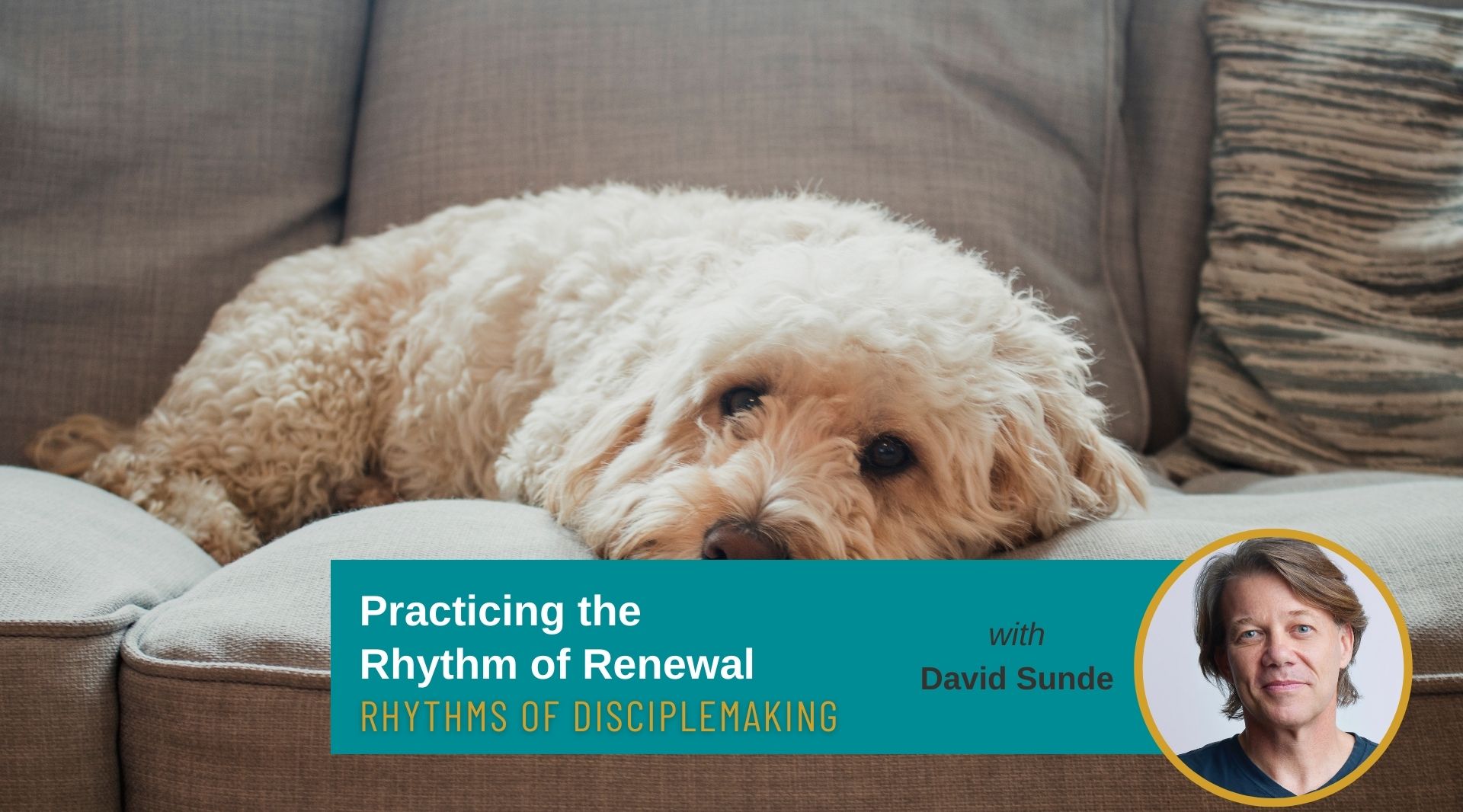This is the second post in the Rhythms of Disciplemaking three-part series. In his book, Small-Batch Disciplemaking: A Rhythm for Training the Few to Reach the Many, David Sunde offers seven disciplemaking rhythms (or as David explains, one rhythm that is expressed in seven ways). This series includes three of the seven rhythms. In the first post, David helped you identify where God has been at work in your life. You can read it here. In this next post, David gives us a divine picture of rest.
When our daughter, Annika, was born twenty-two months after our son, I thought I should write a journal for her. Journaling is not my thing, but having a daughter was new territory. I wanted to be thoughtful in nurturing our daddy-daughter relationship. At the same time, as a pastor and father, I was restless about raising pastors’ kids, who often unfairly spend too many hours at church and draw the attention of every parishioner. I wanted to instill in them a living faith, a love for Jesus, not simply a Sunday-go-to-church faith. I had a distinct impression, which I took as a prompt from the Lord, that said, You’ve gotten it half right. It was one of those unique, rare moments where I felt the Spirit saying, Yes, be Christ to her. But I also want to teach you about Me through her, so take note! And so, for thirteen years, I kept a handwritten journal of how God’s Spirit was teaching me to grow in faith through my interactions with my daughter. While it wasn’t a natural discipline for me, it became a great practice for allowing God to continually resensitize my heart.
Here’s an entry from one of those “divine interruptions,” recorded when Annika was fifteen months old:
Last night, you were up a couple of different times, which isn’t unusual as you’re still breastfeeding. While I could hear you crying—and with me wanting to sleep—I asked the Lord to help me see and experience Him. And at that moment, it was like I heard an immediate response! It was as if God was speaking through your tears—and an untimely interruption into my rest—THAT’S ME!! Those are My cries to want to be with you at all times! It was like God was saying, “Don’t just roll over and think you can find Me later”.
Instead, I got up to find you standing in your crib. Normally, you have a one-track mind, wanting Mommy and to be fed. But this was different. I held you, and we talked, me with words and gestures. I said, “I’m here. Daddy loves you.” You put your head on my shoulder, and we held each other . . . until we were both comforted. It was 2:00 a.m., but God’s presence (and lesson) was noticed.
The rhythm of renewal is about regularly and continually resensitizing our hearts so we can hear God’s whisper, respond when the Spirit guides, and yield when God prompts. As mature disciplemakers, a rhythm of renewal enables us to be attentive to the Holy Spirit so that being attentive to what God is saying will help us speak prophetically to young believers. If our goal is to be effective small-batch disciplemakers, practicing the rhythm of renewal will help us get there.
So first, what does our rest produce?
Scripture doesn’t invite us to sleep, vacation, unload responsibilities, or pursue a more convenient way of living. Renewal isn’t meant to restore our margins so we can live the life we want to live. Nor does it mean the struggle or tension in life goes away; rather, biblical renewal recenters and resensitizes our hearts to God’s presence.
Maybe most people don’t experience more growth because it’s sadly normal to allow our hearts to grow calloused. We often insulate ourselves from getting too upset or feeling too vulnerable. So how can we remain responsive and grow closer to God when we guard our hearts? By practicing the rhythm of renewal, which recenters us on the one who gives life. Renewal invites us to combat a culture that feeds our ambition, consumption, and insecurities. Growth of any kind takes time because it involves both unlearning old habits and discovering a new way to live. The renewal process allows us to change from the inside out, by renewing our minds and resensitizing our hearts (Romans 12:2). It can be saddening, challenging, and even painful, but that doesn’t mean goodness, beauty, and new life don’t emerge! The goal is that we might be made new, more like the image of God, and participate in His redemption and restoration. Again, to do that, we need our hearts to be resensitized.
Second, how can we steward our influence while keeping in mind the Spirit’s role?
With an apprentice, it’s important to speak to their potential about who they can become in Christ. This is one of the most critical and life-giving (yet rarely taught) aspects of the Christian’s life. Without trying to be a prophet, every believer can (and should) learn to speak prophetically to younger and teachable believers. As God gives you insight and your relationship with an apprentice deepens, you will be better able to speak to their spiritual and ministry potential.
Often, small decisions make a big difference over time, just as shifting a mere two degrees will create a radically different trajectory for an entire journey. I never like to say, “God told me . . .” when speaking into someone’s life. But when I have an impression— that may or may not be from God—I like to simply offer it by saying, “I had this idea . . . see if this resonates.” If I’ve heard from God, I don’t need to be persuasive to get the message across. What’s also happening in this rhythm of renewal is that we are developing a model for sensitivity. We can be busy and still be attentive to God’s Holy Spirit. It takes practice, but over time we can become more, if not very, familiar with how God is speaking and guiding us. And the best way to learn this spiritual discernment isn’t in a classroom or from a sermon but in the safety of a developmental relationship with someone further along.


David Sunde
David Sunde has been involved in professional non-profit and spiritual leadership for over 20 years. He’s a native son of San Francisco, California, with a bachelor’s in public administration from San Diego State University and a master’s degree from Azusa Pacific University. He is currently working on his Doctorate in Semiotics, Culture & the Church through George Fox University. David and his wife, Laurel, have two kids, Bjorn and Annika and live in Austin, TX.




Just read a short article about your journey on assisting others in disciplemaking . Currently God has stirred in my heart to pursue prayer in my retirement. My wife and I were in ministry over 27 years caring for the elderly in New York. During that time God put young men in our lives, now married with families with life’s responsibilities and the weight it brings on them in my heart.
Praying for these seven men along with encouraging them to fight the good fight. Also, that they stay true to the Lord and his calling in their lives. Being retired I want to invest time in prayer for them. I’m asking God to show me the way to assist them with their walk with him through his son.
Navigators was a huge part of my life in my early years as a newborn Christian. A good foundation was established with Jesus Christ being the center of it all. The rest is history of his grace on my life.
Thank you for your commitment and obedience to his calling in discipleship. The world is in desperate need for the light of God to be shown and to be made known.
Take care my brother and may our awesome God continue to flood his Holy Spirit on you as you write!